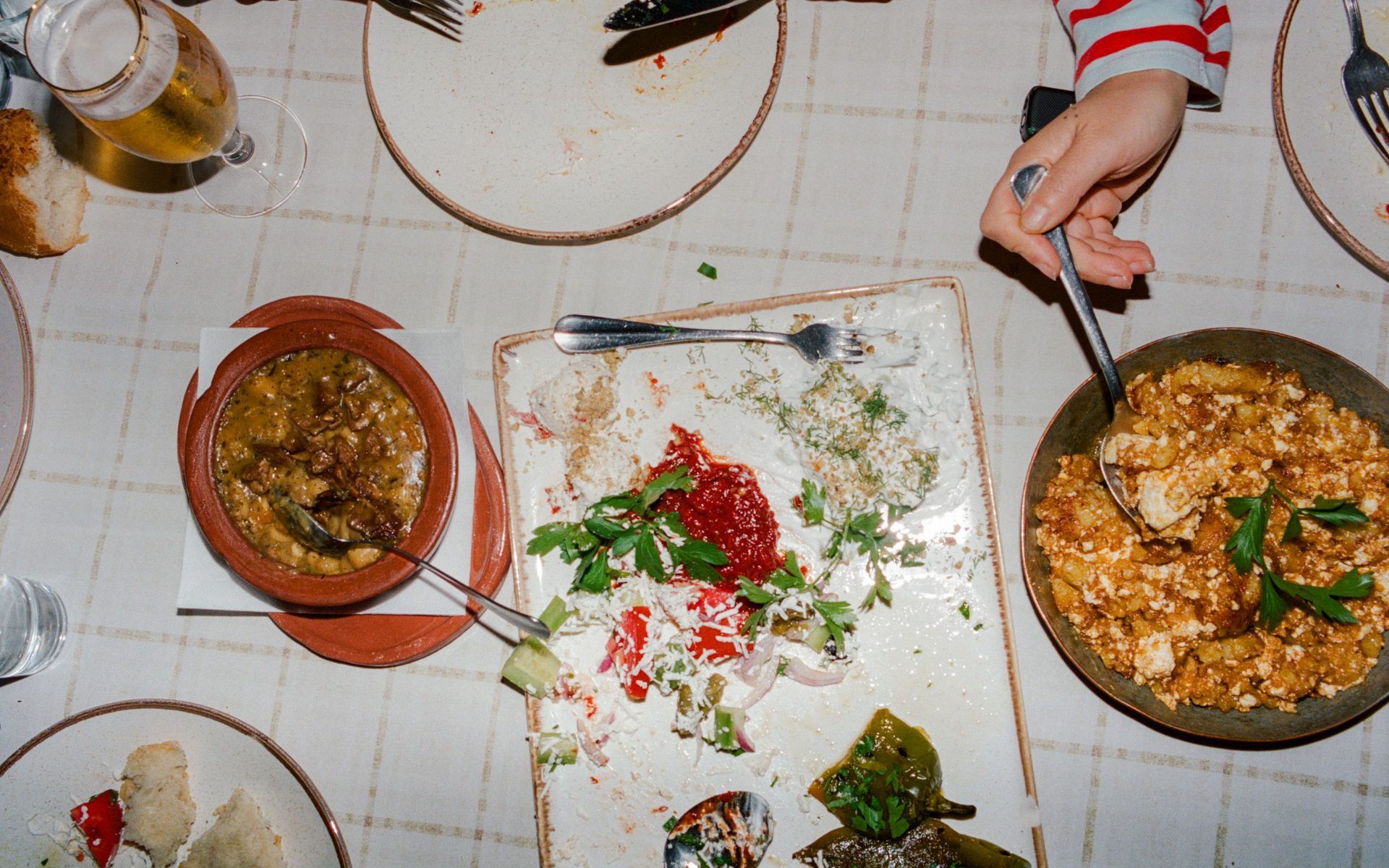Traveling from Sofia to Plovdiv by train, writer Belinda Jackson and photographer Sarah Pannell discover Bulgaria’s unique food scene and are introduced to the local concept of ‘aylyak’—a state of delight that comes from living slowly.
I’m waiting at the gritty Kulata checkpoint on the Greek-Bulgarian border, as a young, open-faced guard inspects my Australian passport. He enquires about my intentions in this overlooked corner of the Balkans. “We’ve come to eat!” I tell him. “Can I join?” he says with a laugh, stamping my page.
At the easternmost edge of Europe, Bulgaria is a curious creature. While its southern neighbor Greece gets all the tourism glory, very few travelers make the journey to taste Bulgaria’s indigenous wines or the delights of a flaky, well-stuffed banitsa pastry.
This is not my first jaunt to Bulgaria. In my backpacking years, I once arrived on a smoke-belching overnight bus from Istanbul to hike its Central Balkan mountains. This time, I’m traveling on a Eurail railway pass, taking the slow train through to the capital, Sofia, watching as guards in peaked military hats wave the train through pretty, vine-covered stations.
Chic, but no less Bulgarian, Cosmos restaurant is the serial winner of the city’s top food scene awards. “We cook authentic Bulgarian cuisine in a modern way,” chef Vladislav Penov tells me.
Like Ekatarina, he wants to preserve Bulgaria’s food heritage, drawing his produce from farms and small producers mostly within the Rhodope Mountains, which stretch across southern Bulgaria and parts of Greece. Most special is their cherni vit, a rare, prized sheep’s cheese colored by naturally-occurring green mold. Historically made in only in the village of Cherni Vit, it was rescued from the brink of extinction by Slow Food representatives in 2007.
Cosmos is also a leading innovator in fermentation, its own lab experimenting with sourdoughs, vinegars and koji, a fungus used in pickling, soy sauces and cured meats. According to Penov, Cosmos is the only place in the world where you can try koji-fermented coffee.
Lulled into a rhythm of reading, chatting and passing red-roofed villages, we pull pieces of banitsa from oil-soaked bags. Don’t fight the grease; that’s why it tastes so good. We coast past a horse and cart, and a railway worker—framed perfectly in the soft morning sun—sees my fellow traveler and photographer Sarah Pannell raise her camera, and blows her a kiss.
One of Europe’s oldest cities, Plovdiv has morphed from a 6,000 year-old Neolithic settlement to a lively university town. It’s easy to get lost in the district of Kapana, a car-free knot of cobblestone streets that translates to ‘The Trap’. I wend between cafes and craft beer dens, a 14th-century mosque and Turkish café, giant murals and tiny galleries.
A decade ago, this area was all closed shops and deserted warehouses, says Plovidiv restaurateur Raycho Markov of Pavaj restaurant, but it has been saved by its crowning as a European Capital of Culture in both 1999 and again in 2019.
My final Bulgaria dinner is at Aylyakria restaurant, also in The Trap. The word ‘aylyak’ is particular to Plovdiv. Borrowed from the Turkish word for ‘idleness,’ but without the negativity, it means a state of delight—of living life slowly.
“Everyone says people from Plovdiv are ‘aylyak’,” says owner Rumen Stoykov. “Very calm, very relaxed, enjoying life.”
Dinner kicks off with the charmingly obligatory rakia—but flipped on its head. “Barrel-aged rakia was an old-fashioned drink but it’s becoming popular in cocktails,” says Rumen, handing me a rakia sour. Made with quince rakia, it’s softened deliciously with pear syrup and cardamom bitters.
Every meal, from Sofia to Plovdiv, has been governed by generosity and pride in Bulgaria’s late summer produce, wrought into dishes influenced by empires and eras—from Thracian to Roman, Byzantine and Soviet.
Yet despite its wealth of food and history, Bulgaria is still far from the beaten and eaten path. Travelling slowly by train and foot, I’ve witnessed a masterclass in European history, from stone age to new age, and, along the way, met passionate chefs and producers who are joyously bringing Bulgarian recipes and produce to the table.
And I’ve learned that life is best enjoyed like rakia—sipped slowly, and savoured fully, in a state of ‘aylyak’.
Writer and photographer were hosted by Eurail, eurail.com

